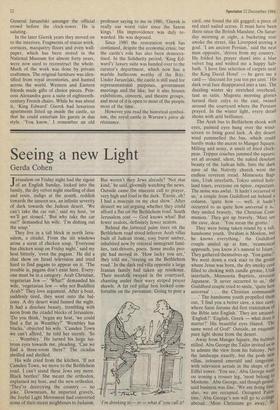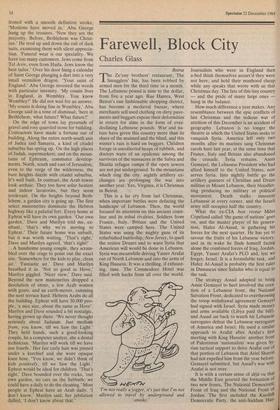Seeing a new Light
Gerda Cohen
Terusalem on Friday night had the rigour J of an English Sunday, locked into the family, the dry velvet night smelling of dust and resin, indigo at the zenith, reddish towards the unseen sea, an infinite severity of dark towards the Judean desert. 'We can't take the car out,' said my host, 'or we'll get stoned.' But why take the car out?' demanded his wife. 'I'm dishing out the soup.'
They live in a tall block in north Jeru- salem, a citadel. From the slit windows arose a scent of chicken soup. 'Everyone has chicken soup on Friday night,' said my host bitterly, 'even the pagans.' He did a chat show on Israel television and tried hard to find pagans to appear on it. 'The trouble is, pagans don't exist here. Every- one must be in a category: Arab Christian, vegetarian Jew —"What?' demanded his wife, 'vegetarian Jew — why not Buddhist Arab?' They love argument. After a bout, suddenly tired, they went onto the bal- cony. A dry desert wind fanned the night. It had a desolate beauty, trembling with neon from the citadel blocks of Jerusalem. `Do you think,' began my host, 'we could find a flat in Wembley?' Wembley has blacks,' objected his wife. 'Camden Town we can't afford,' he told her sternly. `So . . . Wembley.' He turned his large lus- trous eyes towards me, pleading, 'Can we find a three-room there?' The cicadas shrilled and shrilled.
His wife cried from the kitchen, 'If not Camden Town, we move to the Bethlehem road. I can't stand these Jews any more. Black beetles!' She meant the orthodox, explained my host, and the new orthodox. `They're destroying the country — no joke.' Downstairs, he imparted gravely, the Joyful Light Movement had converted some of their nicest neighbours to Judaism.
But weren't they Jews already? 'Not that kind,' he said, gloomily watching the news. Outside came the muezzin call to prayer, very high and loud in the dark. 'Exotic, eh? I had a muezzin on my chat show.' After dessert we sat arguing whether they could afford a flat on the Bethlehem road. South Jerusalem cost — God knows what! But fewer zealots, definitely fewer zealots.
Behind the tattered palm trees on the Bethlehem road stood leftover Arab villas built of Judean stone, rosy burnt umber, inhabited now by oriental immigrant fami- lies, taxi-drivers, poets. Some media peo- ple had moved in. 'How lucky you are,' they told me, 'staying on the Bethlehem road.' In the dark red villa opposite a large Iranian family had taken up residence. Their menfolk swayed in the courtyard, chanting under their wavy striped prayer shawls. A fat red pillar box looked com- fortable on the pavement. Going to post a 'I'm drinking to — er — what d"you call it? card, one found the slit gagged; a piece of red steel nailed across. It must have been there since the British Mandate. On Satur- day morning at eight, a bucketing roar awoke the street, like Liverpool scoring a goal. 'I am ancient Persian,' said the neat man opposite, 'driven from my country.' He folded his prayer shawl into a blue velvet bag and wished me a happy Sab- bath. 'I have fine selection of carpets near the King David Hotel' — he gave me a card — 'discount for you ten per cent.' His dark oval face disappeared into a taxi. The dazzling winter sky stretched overhead, taut as satin. Magenta morning glories turned their calyx to the east, twined around the courtyard where the Persians prayed. In the winter light, every detail shone with arid brilliance.
The Arab bus to Bethlehem shook with eyes, painted eyes hung over the wind- screen to bring good luck. A dry desert wind pummelled the bus, which could hardly make the ascent to Manger Square. Milling and noisy, it smelt of fried chick- peas. Tripper coaches jammed the square; yet all around, silent, the naked desolate beauty of the Judean hills. Into the dark nave of the Nativity church went the endless reverent tread. Minnesota Bap- tists, Utah interfaith, Tokyo united holy- land tours, everyone on tiptoe, expectant. The noise was awful. 'It hadn't occurred to us,' a couple from Guildford sat behind a column, 'quite how — well, it hadn't occurred to us quite how universal it is,' they smiled bravely, 'the Christian Com- munion.' They got up bravely. 'Must see the cave, dear.' You mean the grotto.'
They were being taken round by a tall, handsome youth. 'Ibrahim is Moslem, but he knows everything,' the Guildford couple smiled up at him, 'ecumenical approach, you know it's natural to Islam. They gathered themselves up. 'You game?, We went down a rock stair to the grotto where Jesus was born, the dry smoky cave filled to choking with candle grease, Utah interfaith, Minnesota Baptists, reverent Japanese. 'It never occurred to us,' the Guildford couple tried to smile, 'quite how universal . . . the Christian communion . .' The handsome youth propelled them out, 'I find you a better cave, a nice cave, where Saint Jerome did first translation of the Bible into English.' They are amazed. `English?"English, Greek — what does it matter?' His beautiful eyes blazed. 'The same word of God!' Outside, an exquisite pure light shone from the desert. Away from Manger Square, the hubbub stilled. Abu George the Tailor invited us In to admire the view from his balcony. Not the landscape exactly, but the posh new villas, coloured emerald and tangerine, with television aerials in the shape of an Eiffel tower. 'You see,' Abu George went on ironing a trouser leg, 'most belong 10 Moslems.' Abu George, sad though genial, said business was fine. 'We are doing fine, also, we are occupied-. Occupied Pales' tine.' Abu George's son will go to college abroad. 'Most Christians go away,' he i
ironed with a smooth definitive stroke `Moslems have moved in.' Abu George hung up the trousers. 'Now they are the majority. Before, Bethlehem was Christ- ian.' He trod up and down the rail of dark suits, examining them with silent apprecia- tion. 'Funeral wear is our speciality. We have too many customers. Jews come from Tel Aviv, even from Haifa. Jews know the best tailor.' Over his door hung a calendar of Saint George plunging a dart into a very small vermilion dragon. 'Your saint of England.' Abu George invested the words with particular intensity. 'My cousin lives in England, in Wembley. You know Wembley?' He did not wait for an answer. `My cousin is doing fine in Wembley,' Abu George said in a tone of dismissal; 'here in Bethlehem, what future? What future?'
On the edge of town lay pyramids of gravel and rosy quarried stone for building. Contractors have made a fortune out of building. Along the entire north-south axis of Judea and Samaria, a kind of citadel suburbia has spring up. On the high places of Judah, supermarkets; and on the moun- tains of Ephraim, commuter develop- ments. North, south and east of Jerusalem, even to the verge of the wilderness, the bare heights dazzle with citadel suburbia. It's well built. In contrast, the Arab towns look archaic. They too have solar heaters and indoor lavatories, but they seem irrelevant. On the heights beyond Beth- lehem, a garden city is going up. The first select maisonettes dominate the Hebron highway like a palatial fort. Every home at Ephrat will have its own garden. 'Our own garden,' Dave and Marilyn told me, ex- ultant, 'that's why we're moving to Ephrat.' Their future home was unbuilt, but it was worth waiting. 'That's right,' Dave and Marilyn agreed, 'that's right!'
. A handsome young couple, they scram- bled over the crags to point out the exact site. 'Somewhere for the kids to play, clean air.' Fantastic air.' Dave and Marilyn breathed it in. 'Not so good as Hove,' Marilyn giggled. 'Nicer view,' Dave said. Beyond the new maisonettes dropped a desolation of stone, a few Arab women with goats, and an earth-mover, ramming the next terrace hard. Hebron Arabs do all the building. Ephrat will have 30,000 peo- ple, 'a nice size, about the same as Hove'. Marilyn and Dave sounded a bit nostalgic, having grown up there. 'We never thought seriously about Judaism. Just medium frum, you know, till we Saw the Light.' They held hands, such a good-looking couple, he a computer analyst, she a dental technician. 'Marilyn will work till we have our fourth.' Her fair curly hair was pinned under a kerchief and she wore opaque knee hose. 'You know, we didn't think of kids positively, till we Saw the Light.' Ephrat would be ideal for children. 'That's right,' Dave bounded over the rocks, 'our own garden, no cars on the Sabbath; we could have a daily to do the cleaning.' Most people at Ephrat have an Arab daily. 'I don't know,' Marilyn said, her jubilation dulled, 'I don't know about that.'







































































 Previous page
Previous page